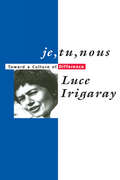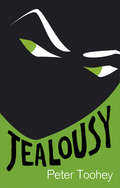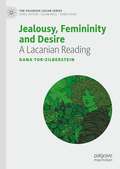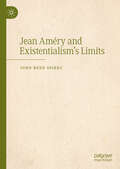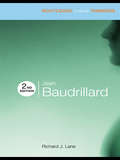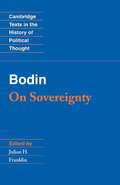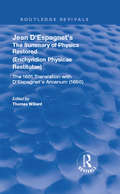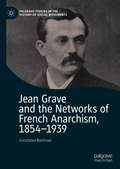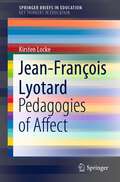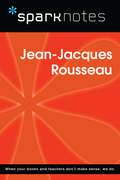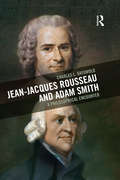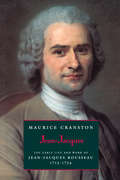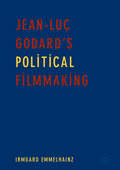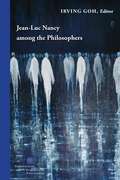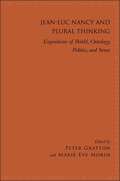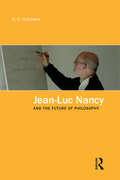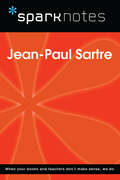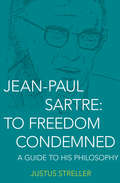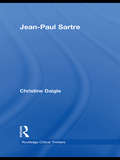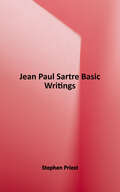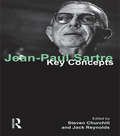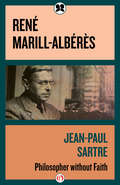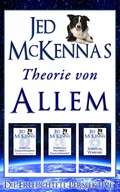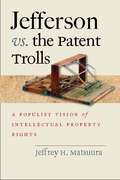- Table View
- List View
Je, Tu, Nous: Toward a Culture of Difference (Routledge Classics Ser.)
by Luce IrigarayFirst published in 1993. Routledge is an imprint of Taylor & Francis, an informa company.
Jealousy
by Peter TooheyCompete, acquire, succeed, enjoy: the pressures of living in today's materialistic world seem predicated upon jealousy--the feelings of rivalry and resentment for possession of whatever the other has. But while our newspapers abound with stories of the sometimes droll, sometimes deadly consequences of sexual jealousy, Peter Toohey argues in this charmingly provocative book that jealousy is much more than the destructive emotion it is commonly assumed to be. It helps as much as it harms. Examining the meaning, history, and value of jealousy, Toohey places the emotion at the core of modern culture, creativity, and civilization--not merely the sexual relationship. His eclectic approach weaves together psychology, art and literature, neuroscience, anthropology, and a host of other disciplines to offer fresh and intriguing contemporary perspectives on violence, the family, the workplace, animal behavior, and psychopathology. Ranging from the streets of London to Pacific islands, and from the classical world to today, this is an elegant, smart, and beautifully illustrated defense of a not-always-deadly sin.
Jealousy, Femininity and Desire: A Lacanian Reading (The Palgrave Lacan Series)
by Dana Tor-ZilbersteinDrawing on Freudian and Lacanian psychoanalysis, this book intervenes into debates concerning the relation between jealousy and envy on the one hand, and sexual difference on the other. The author presents an original distinction between what is termed “feminine” and “phallic” forms of jealousy while mapping and theorizing other types of jealousy that she finds in the writings of Sigmund Freud and Jacques Lacan. The discussion performs literary-critical readings of texts by Olivia Shakespear and Marguerite Duras as a means of shedding light on the topic and the distinction. Further, it discusses the challenge posed by jealousy’s particular mode of jouissance and its possible vicissitudes. Though the experience of jealousy can be ravaging, the author claims, it also provides the subject an opportunity to reorient its relation to jouissance and thereby experience significant psychical change. In doing so, it provides a new outlook on jealousy as being connected to both femininity and desire, unveiling its complex character, features, and vitality within a Lacanian psychoanalytic framework. It will appeal in particular to those with an interest in psychoanalysis, literary theory and critical theory.
Jean Améry and Existentialism’s Limits
by John Reed SpiersThis book provides an in-depth analysis of the influences and impact of philosopher, writer and public intellectual, Jean Améry. Améry&’s writing is often analysed in terms of his experiences as a Jew in Austria during WWII which saw him stripped of his identity, driven into exile, and dehumanised in torture and the death camps. Despite the increasing interest in the philosophical, ethical, and literary dimensions of Améry&’s thought, little research discusses his relationship with the most important intellectual discovery of his life: existentialism. This book contributes to and expands upon recent engagements with Améry&’s work by situating him within the existential tradition and discussing his writing within the context of his peers and influences. John Reed Spiers argues that reading Améry in the context of the existential tradition contributes to a greater appreciation of his importance as a writer reflecting on the human condition, broadening the Anglophone reception of his work beyond Holocaust Studies, trauma studies, and victimology.
Jean Baudrillard (Routledge Critical Thinkers)
by Richard J. LaneJean Baudrillard is one of the most controversial theorists of our time, famous for his claim that the Gulf War never happened and for his provocative writing on terrorism, specifically 9/11. This new and fully updated second edition includes: an introduction to Baudrillard’s key works and theories such as simulation and hyperreality coverage of Baudrillard’s later work on the question of postmodernism a new chapter on Baudrillard and terrorism engagement with architecture and urbanism through the Utopie group a look at the most recent applications of Baudrillard’s ideas. Richard J. Lane offers a comprehensive introduction to this complex and fascinating theorist, also examining the impact that Baudrillard has had on literary studies, media and cultural studies, sociology, philosophy and postmodernism.
Jean Bodin: Four chapters from The Six Books of the Commonwealth
by Jean Bodin Julian H. FranklinThis volume contains the essential points of Jean Bodin's theory of sovereignty, a landmark in legal theory and royalist ideology.
Jean D'Espagnet's The Summary of Physics Restored: The 1651 Translation With D'espagnet's Arcanum (1650) (Routledge Revivals #7)
by Jean D'EspagnetPublished in 1999: This book is about Alchemy, Philosophy and Science during the 17th century written by the author originally published in 1650.
Jean Grave and the Networks of French Anarchism, 1854-1939 (Palgrave Studies in the History of Social Movements)
by Constance BantmanThis biography charts the life and fascinating long militant career of the French anarchist journalist, editor, theorist, writer, campaigner and educator Jean Grave (1854-1939), from the run up to the 1871 Paris Commune to the eve of the Second World War. Through Grave, it explores the history of the French and international anarchist communist movement over seven decades: its “heroic period” (1880-1890s), shaken by terrorist violence and intense repression, the emergence of syndicalism, national and international solidarity campaigns, the divisions over the First World War, and post-war division and relegation. Through Grave, a “sedentary transnationalist,” the study investigates the networked and transnational organisation of the anarchist movement, addressing the paradox of Grave’s international influence alongside his deep rootedness in Paris by emphasizing the movement’s global print culture and staggering circulations.
Jean-François Lyotard: Pedagogies of Affect (SpringerBriefs in Education)
by Kirsten LockeThis book gives an introduction to Jean-François Lyotard (1924–1998) as an educational thinker whose philosophical encounters with politics and art offer a radical reconsideration of the aims of education and the nature of pedagogy. The book approaches Jean-François Lyotard’s contributions to educational thought by placing his changing intellectual career within its thematic and pedagogical context. Central chapters deal with Lyotard’s key concepts utilised throughout different phases of his intellectual career, providing new openings and perspectives to an affective form of pedagogy that questions the conditions and perimeters of the educational endeavour as a learning and teaching event. Within these discussions, Lyotard’s ideas about aesthetics and politics receive close attention. The book positions Lyotard’s pedagogical focus within key theoretical concepts traversed in his political and aesthetic writings, exploring his work on the political as an ethical activity, art as resistance, and his later work on childhood and infancy as a state of openness and receptivity.
Jean-Jacques Rousseau (SparkNotes Philosophy Guide)
by SparkNotesJean-Jacques Rousseau (SparkNotes Philosophy Guide) Making the reading experience fun! SparkNotes Philosophy Guides are one-stop guides to the great works of philosophy–masterpieces that stand at the foundations of Western thought. Inside each Philosophy Guide you&’ll find insightful overviews of great philosophical works of the Western world.
Jean-Jacques Rousseau and Adam Smith: A Philosophical Encounter
by Charles L GriswoldJean-Jacques Rousseau and Adam Smith are giants of eighteenth century thought. The heated controversy provoked by their competing visions of human nature and society still resonates today. Smith himself reviewed Rousseau's Discourse on Inequality, and his perceptive remarks raise an intriguing question: what would a conversation between these two great thinkers look like? In this outstanding book Charles Griswold analyzes, compares and evaluates some of the key ways in which Rousseau and Smith address what could be termed "the question of the self". Both thinkers discuss what we are by nature (in particular, whether we are sociable or not), who we have become, whether we can know ourselves or each other, how best to articulate the human condition, what it would mean to be free, and whether there is anything that can be done to remedy our deeply imperfect condition. In the course of examining their rich and contrasting views, Griswold puts Rousseau and Smith in dialogue by imagining what they might say in reply to one another. Griswold’s wide-ranging exploration includes discussion of issues such as narcissism, self-falsification, sympathy, the scope of philosophy, and the relation between liberty, religion and civic order. A superb exploration of two major philosophers, Jean-Jacques Rousseau and Adam Smith: A Philosophical Encounter is essential reading for students and scholars of these two figures, eighteenth century philosophy, the Enlightenment, moral philosophy, and the history of ideas. It will also be of interest to those in related disciplines such as political theory, economics, and religion.
Jean-Jacques: The Early Life And Work Of Jean-Jacques Rousseau, 1712-1754
by Maurice CranstonIn recent years Rousseau has returned to public favour. Before the war he was commonly regarded as an evil genius, a prophet at once of fascism and of communism, an enemy of reason and science, responsible both for the romantic revival and the French Revolution, a mountebank, a psychotic and a freak.
Jean-Luc Godard’s Political Filmmaking
by Irmgard EmmelhainzThis book offers an examination of the political dimensions of a number of Jean-Luc Godard’s films from the 1960s to the present. The author seeks to dispel the myth that Godard’s work abandoned political questions after the 1970s and was limited to merely formal ones. The book includes a discussion of militant filmmaking and Godard’s little-known films from the Dziga Vertov Group period, which were made in collaboration with Jean-Pierre Gorin. The chapters present a thorough account of Godard’s investigations on the issue of aesthetic-political representation, including his controversial juxtaposition of the Shoah and the Nakba. Emmelhainz argues that the French director’s oeuvre highlights contradictions between aesthetics and politics in a quest for a dialectical image. By positing all of Godard’s work as experiments in dialectical materialist filmmaking, from Le Petit soldat (1963) to Adieu au langage (2014), the author brings attention to Godard’s ongoing inquiry on the role filmmakers can have in progressive political engagement.
Jean-Luc Nancy among the Philosophers (Perspectives in Continental Philosophy)
by Irving GohThis volume focuses on the relational aspect of Jean-Luc Nancy’s thinking. As Nancy himself showed, thinking might be a solitary activity but it is never singular in its dimension. Building on or breaking away from other thoughts, especially those by thinkers who had come before, thinking is always plural, relational. This “singular plural” dimension of thought in Nancy’s philosophical writings demands explication.In this book, some of today’s leading scholars in the theoretical humanities shed light on how Nancy’s thought both shares with and departs from Descartes, Hegel, Marx, Heidegger, Weil, Lacan, Merleau-Ponty, and Lyotard, elucidating “the sharing of voices,” in Nancy’s phrase, between Nancy and these thinkers.Contributors: Georges Van Den Abbeele, Emily Apter, Rodolphe Gasché, Werner Hamacher, Eleanor Kaufman, Marie-Eve Morin, Timothy Murray, Jean-Luc Nancy, and John H. Smith
Jean-Luc Nancy and Plural Thinking: Expositions of World, Ontology, Politics, and Sense (SUNY series in Contemporary French Thought)
by Marie-Eve Morin Peter GrattonJean-Luc Nancy is one of the leading voices in European philosophy of the last thirty years, and he has influenced a range of fields, including theology, aesthetics, and political theory. This volume offers the widest and most up-to-date responses to his work, oriented by the themes of world, finitude, and sense, with attention also given to his recent project on the "deconstruction of Christianity." Focusing on Nancy's writings on globalization, Christianity, the plurality of art forms, his materialist ontology, as well as a range of contemporary issues, an international group of scholars provides not just inventive interpretations of Nancy's work but also essays taking on the most pressing issues of today. The collection brings to the fore the originality of his thinking and points to the future of continental philosophy. A previously unpublished interview with Nancy concludes the volume.
Jean-Luc Nancy and the Future of Philosophy
by B.C. HutchensThe work of the contemporary French philosopher Jean-Luc Nancy has impacted across a range of disciplines. His writings on psychoanalysis, theology, art, culture and, of course, philosophy are now widely translated and much discussed. His L'Experience de la Liberte (1988) is considered to be one of the landmarks of contemporary continental philosophy. Jean-Luc Nancy and the Future of Philosophy is the first genuine introduction to Nancy's ideas and a clear and succinct appraisal of a burgeoning reputation. The book summarises topically the primary conceptual areas of Nancy's thought and explores its relevance for contemporary issues like nationalism, racism and media rights. Nancy's indebtedness to Nietzsche, Heidegger, and Bataille is examined as well as how his ideas compare to those of his contemporary continental thinkers. Three major areas of Nancy's work are emphasised: freedom and morality; community and politics; and arts and the media. The reader is guided through a chosen theme without being lost in a welter of allusive language, jargon is avoided where possible and when unavoidable it is clearly explained. The book concludes with a new interview with Nancy, which discusses the future of philosophy. The book will be an important addition to the readings lists for courses on contemporary continental thought and political philosophy.
Jean-Paul Sartre (SparkNotes Philosophy Guide)
by SparkNotesJean-Paul Sartre (SparkNotes Philosophy Guide) Making the reading experience fun! SparkNotes Philosophy Guides are one-stop guides to the great works of philosophy–masterpieces that stand at the foundations of Western thought. Inside each Philosophy Guide you&’ll find insightful overviews of great philosophical works of the Western world.
Jean-Paul Sartre: A Guide to His Philosophy
by Justus StrellerJean-Paul Sartre&’s most influential existentialist work, Being and Nothingness, broken down into its most fertile ideas In To Freedom Condemned, Sartre&’s most influential work, Being and Nothingness, is laid bare, presenting the philosopher&’s key ideas regarding existentialism. Covering the philosophers Hegel, Heidegger, and Husserl, and mulling over such topics as love, God, death, and freedom, To Freedom Condemned goes on to consider Sartre&’s treatment of the complexities around human existence.
Jean-Paul Sartre: An Existential Odyssey With Jean-paul Sartre (Routledge Critical Thinkers)
by Christine DaigleA critical figure in twentieth-century literature and philosophy, Jean-Paul Sartre changed the course of critical thought, and claimed a new, important role for the intellectual. Christine Daigle sets Sartre’s thought in context, and considers a number of key ideas in detail, charting their impact and continuing influence, including: Sartre’s theories of consciousness, being and freedom as outlined in Being and Nothingness and other texts the ethics of authenticity and absolute responsibility concrete relations, sexual relationships and gender difference, focusing on the significance of the alienating look of the Other the social and political role of the author the legacy of Sartre’s theories and their relationship to structuralism and philosophy of mind. Introducing both literary and philosophical texts by Sartre, this volume makes Sartre’s ideas newly accessible to students of literary and cultural studies as well as to students of continental philosophy and French.
Jean-Paul Sartre: Basic Writings
by Stephen PriestJean-Paul Sartre is one of the most famous philosophers of the twentieth century. The principle founder of existentialism, a political thinker and famous novelist and dramatist, his work has exerted enormous influence in philosophy, literature, politics and cultural studies. <p><p>Jean-Paul Sartre: Basic Writings is the first collection of Sartre's key philosophical writings and provides an indispensable resource for all students and readers of his work. Stephen Priest's clear and helpful introductions set each reading in context, making the volume an ideal companion to those coming to Sartre's writings for the first time.
Jean-Paul Sartre: Key Concepts (Key Concepts)
by Steven Churchill Dr. Jack ReynoldsMost readers of Sartre focus only on the works written at the peak of his influence as a public intellectual in the 1940s, notably "Being and Nothingness". "Jean-Paul Sartre: Key Concepts" aims to reassess Sartre and to introduce readers to the full breadth of his philosophy. Bringing together leading international scholars, the book examines concepts from across Sartre's career, from his initial views on the "inner life" of conscious experience, to his later conceptions of hope as the binding agent for a common humanity. The book will be invaluable to readers looking for a comprehensive assessment of Sartre's thinking - from his early influences to the development of his key concepts, to his legacy.
Jean-Paul Sartre: Philosopher Without Faith
by René Marill-AlbérèsProfessor Albérès in this well-ordered volume traces through successive works the elaboration of various concepts now linked to French Existentialism—anguish, nausea, hypocrisy, lucidity, consciousness, conformity, commitment, ethical values, situation, etc. Translated from the French by Wade Baskin.
Jed McKenna se Teorie van Alles: Die Ingeligte Perspektief
by Adri Van Schalkwyk Jed MckennaOns is geprogrammeer van geboorte af om te glo dat ons bestaan ʼn onoplosbare raaisel is, maar as ons ʼn eerlike poging aanwend, dan ontdek ons dat misterie self die raaisel is. Nie net wat is die groot misterie nie, maar hoekom is daar enige misterie? En wat as daar nie is nie? Wat as die Mysterium Tremendum net ʼn interne oortuiging is sonder enige eksterne eweknie? Wat as die antwoorde op die grootste vrae van die lewe eenvoudig en voor die hand liggend is en reg voor jou is? As mens sal slaan, slaan deur die masker! Hoe kan die gevangene buite toe reik behalwe om deur die muur te stoot? -Herman Melville As jy belangstel om deur die masker te slaan, dan sal jy bly wees om te weet dat daar ʼn teorie van alles is wat perfekte sin maak, wat nie staatmaak op godsdienstige of wetenskaplike kullery nie en wat jy maklik en direk kan verstaan. En as jy vertroud is met Jed McKenna en die Enlightenment Trilogy, dan weet jy dit is nie net ʼn teorie nie.
Jed McKennas Theorie von Allem: Die Erleuchtete Perspektive
by Jed Mckenna Susan TroegerWir werden von Geburt an darauf programmiert zu glauben, unsere Existenz sei ein unlösbares Rätsel, doch wenn wir uns wirklich Mühe geben, dann entdecken wir, dass das Geheimnis selbst das Rätsel ist. Nicht nur, was das große Geheimnis ist, sondern auch warum es überhaupt ein Geheimnis gibt. Und was wäre, wenn es gar keines gäbe? Was wäre, wenn das große Geheimnis nur ein innerer Glaube ohne äußere Entsprechung wäre? Was wäre, wenn die Antworten auf die größten Fragen des Lebens direkt vor uns lägen? "Wenn der Mensch schlagen will, so schlag er durch die Maske! Wie kann der Häftling denn ins Freie, wenn er die Mauer nicht durchbricht? - Herman Melville Alle, die durch die Maske schlagen wollen, werden eine Theorie von Allem begrüßen, die Sinn macht, die sich nicht auf religiöse oder wissenschaftliche Schikane verlässt und die leicht verständlich ist. Und diejenigen, die mit Jed McKenna vertraut sind, werden wissen, dass es sich nicht nur um eine Theorie handelt.
Jefferson vs. the Patent Trolls: A Populist Vision of Intellectual Property Rights
by Jeffrey H. MatsuuraOf all the founding fathers, Thomas Jefferson had the most substantial direct experience with the issues surrounding intellectual property rights and their impact on creativity, invention, and innovation. In our own digital age, in which IP has again become the object of intense debate, his voice remains one of the most vital in American history on this crucial subject.Jefferson lived in a time of immense change, when inventions and other creative works impacted the world profoundly. In this atmosphere it became clear that the developers of creative works and the users of those works often have competing interests. Jefferson appreciated as well as anyone that the originators of ideas needed legal protection. He also knew that innovation was crucial for a nation's economic prosperity as well as its political health, and that rights should not become barriers.Jefferson was in a unique position to understand the issues of intellectual property rights. His pronouncements on these issues were those not of a scholar but, rather, of a practitioner. As a scientist, author, and inventor, he was a prolific creator. He was also a tireless consumer of others' works. As America's first patent commissioner, he decided which ideas merited protection and effectively created the patent review process. Jeffrey Matsuura profiles Jefferson's diverse and substantial experience with these issues and discusses the lessons Jefferson's efforts offer us today, as we grapple with many of the same challenges of balancing IP rights against an effort to foster creativity and innovation. Without inserting Jefferson anachronistically into the current debate, Matsuura does not shy away from positing where in the spectrum of opinion Jefferson's ideas lie. For lawyers, legal and technology historians, and entrepreneurs, Matsuura offers a fresh, historically informed perspective on a current issue of major importance.
